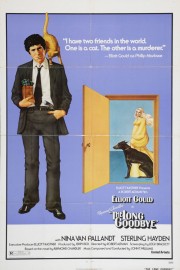The Long Goodbye
Robert Altman’s “The Long Goodbye” represents the first early ’70s John Williams score not associated with Spielberg or Lucas I’ve ever heard, and it’s a weird experience. His main song, “The Long Goodbye,” is all over the soundtrack, and it’s very ’70s, but very fitting for the potboiler detective yarn Altman is telling in this adaptation of Raymond Chandler’s novel. I’ve been waiting to watch this for a long time; it was worth the wait.
I’ve been a massive fan of Howard Hawks’s “The Big Sleep,” also a Chandler adaptation, for over two decades since first watching it. That Altman not only decided to adapt another Chandler novel about Phillip Marlowe, but to bring back screenwriter Leigh Brackett to adapt the novel (she was one of the writers on “The Big Sleep,” as well as “The Empire Strikes Back”) makes this feel like more than just a director who decided to make a film noir on his own, but who recognized some of the components that made the original work, and wanted to do it right. Altman working in a genre is always fascinating, and seeing how he views it in a modern light makes me really look forward to not only seeing films of his I haven’t seen before, but the ones I’ve seen of his again; this makes three in a row of the former in a year and a half that I’ve loved, with “McCabe & Mrs. Miller” and “Popeye” last year.
I’m so familiar with Elliot Gould in comedy, and aging roles, that imagining him in the role of Marlowe- which I associate so much with Humphrey Bogart- is hard to do, until you see the way Altman and Brackett build the character for him. The film makes me curious to read Chandler’s book, if only to see the challenge that might have been in adapting its timeframe from the 1940s to ’70s LA, although I can’t imagine it being that difficult. In this film, Marlowe lives along in a lush apartment building on the outside, but it looks rundown and exactly what you would expect a 1970s Marlowe would live in…with only a cat to feed and take care of. Across the way is an apartment of beautiful women- they are not potential romantic interests for him, just friendly to him and even invite him to spend time with them, and- when he needs to get more cat food, comfortable enough to ask him to pick up some brownie mix for them. There’s so much detail and personality in the opening scenes of this movie with Marlowe that we immediately understand the world he inhabits, and are sucked in. It’s not long before he is drawn into a mystery with the death of a friend’s wife, the apparent death of the friend (Jim Bouton), and then, an alcoholic writer (Sterling Hayden) who frequently goes missing, and the writer’s wife (Nina van Pallandt) who hires him to find the writer.
Based on just the adaptations I’ve seen of the authors, the reason that I think the Coen Brothers hued more towards the Chandler model for noir with “The Big Lebowski” than that of Dashiell Hammett (The Maltese Falcon) is because of the density of the world Chandler builds around Marlowe when it comes to the characters. Terry Lennox (Bouton’s character) is only in a couple of scenes, but he makes a lasting impression. The girls across from Marlowe add something to his world, and in a lesser movie would be romantic possibilities for him; for Altman, they are just friendly, and it is delightful to see that there’s a genuine connection there. Roger Wade (Hayden’s character) has a doctor (Henry Gibson) he sees at a detox facility, and the doctor isn’t above breaking up Roger’s party to get money owed him. Terry Lennox owed someone money, as well, but Marty Augustine (Mark Rydell) is not as polite about it as the doctor is, and when he asked Marlowe to strip, a clue about Lennox reveals that maybe his death was not as real as people claim it was. This is what makes “The Long Goodbye” feel very much like an Altman film; an ensemble cast, allowing him to have characters speak over one another, or to one another while other, more pressing, business is going on in the background.
It’s amazing how two films, centering around the same character, can feel so diametrically opposed to one another in their presentation of the character. In “The Big Sleep,” it feels like we’re getting a romanticized version of private detective work. In “The Long Goodbye,” it feels like we’re getting something resembling a reality to the occupation. I can’t imagine my life without both of them in my moviewatching experience.










